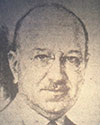 Gov. Henry Horner died early Sunday morning at his summer home in Winnetka, following an illness of almost two years. He would have been 62 years old November 30th.
Gov. Henry Horner died early Sunday morning at his summer home in Winnetka, following an illness of almost two years. He would have been 62 years old November 30th. Gov. Henry Horner died early Sunday morning at his summer home in Winnetka, following an illness of almost two years. He would have been 62 years old November 30th.
Gov. Henry Horner died early Sunday morning at his summer home in Winnetka, following an illness of almost two years. He would have been 62 years old November 30th.
Gov. Horner, who had been seriously ill with heart trouble and high blood pressure following the November, 1938 election, became critically ill Friday night.
Horner, whose political career was capped by two victories over the Chicago Kelly-Nash organization, was taken seriously ill while listening to returns from the 1938 election, in which he took an active part.
Governor Horner, who was one of the five chief executives of Illinois re-elected, was the second to die before completion of his term.
The governor’s death was less than three months before the end of his second four year term which began on January 4, 1937. He first took office January 9, 1933.
The only other Illinois governor to die in office was William H. Bissell, who was inaugurated for his first term on January 11, 1857, and died on March 18, 1860. He was succeeded by Lieut. Gov. John Wood, who served until January 14, 1861. Both were Republicans.
Henry Horner, vote getter par excellence, was born in Chicago on Nov. 30, 1878, the son of Solomon A. Levy and Dilah Horner, whose parents were Chicago pioneers.
He and one brother, Sidney, took their mother’s maiden name when their parents separated by mutual agreement when Horner was 4 years old. Another brother, James, a Chicago automobile dealer, took his father’s name. Both brothers survive.
The governor was a bachelor, and explained he had never married because as a boy he devoted so much time to an invalid mother that he had little opportunity to mingle with youths of his own age.
After his mother’s death he devoted virtually all of his life to the study of law and to his public career. That career was marked thru-out with a surprisingly small amount of personal criticism, although he spent half of his life in the public eye.
His grandfather, Henry Horner, founded a wholesale grocery in Chicago which changed names at various times and now exists as Durand-McNeill-Horner Company. Horner always retained an interest in the company.
The governor was educated in the Chicago public schools and at the Kent College of Law. He began his law career in partnership with Frank Whitney, whose father was a prominent Civil War lawyer and had been associated with Abraham Lincoln in law practice.
Out of his association with Whitney, Horner gained access to many of the Lincoln letters and manuscripts that were the groundwork for his extensive collection of Lincolniana — a collection that filled a room in the State House and was reputed to surpass even that of the Library of Congress. His friends frequently jested with him about the incongruity of a Democratic governor of Illinois so deeply devoted to the state’s greatest Republican.
Horner’s Lincoln library contained more than 6,000 volumes, and in addition he owned numbers of manuscripts and letters written by the Emancipator, as well as a life mask of Lincoln made in 1855 by Leonard W. Volk, a Chicago sculptor.
A record of 18 years in the office of probate judge of Cook county was the springboard from which Horner vaulted into the governor’s mansion. During his terms as judge, Horner was credited with handling almost $3,000,000,000 worth of cash and property in settling estates for widows and orphans without a single loss.
The court is believed to be the largest of its kind in the world. During one year Horner heard 45,975 cases involving estates estimated at $200,000,000 in value. He was the only judge on the probate bench but had 65 assistants.
One of his first acts as governor was to enact sales-tax legislation to replace the state property tax on real estate, and as in most cases of direct taxes with a broad foundation, this legislation was unpopular.
“Here’s the extra penny for Horner,” was the comment frequently made by customers making small purchases.
The first sales tax provided for a levy of 3 per cent, and it was held unconstitutional by the Supreme Court of Illinois. A 2 per cent tax was enacted to withstand court tests and during its first two years provided about $40,000,000 a year. In 1936 the tax was increased to 3 per cent, with the added 1 per cent being earmarked for unemployment relief.
The governor was a man of warm heart and rarely turned a deaf ear to a plea of mercy. He granted clemency to the first woman sentenced to die in the state’s electric chair, commuting her sentence to life imprisonment. Later he refused to interfere with the execution of another woman. He once granted a plea for commutation of a death sentence brought by his friend, the late Clarence Darrow.
Funeral services were held at 11 a.m. yesterday in the 122nd Field Artillery Regiment Armory, Chicago. It was a joint military and state ceremony, under the command of Maj. Gen. Samuel Lawton, recently promoted to the command of the Illinois National Guard. The burial was beside the grave of his mother in Mount Mayriv cemetery.
Current Obituaries in the Astoria South Fulton Argus